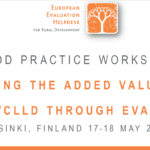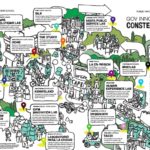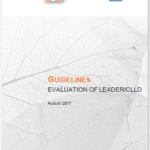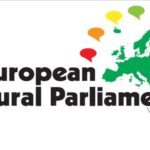CLLD is more often associated with a rural or fisheries context. In this paper by Pietro Verga deals with ‘urban CLLD’, which builds on experiences, particularly, from the URBAN Initiatives and the LEADER programme. His research is based in Berlin and is within the policy context of the German Soziale Stadt programme (Socially Integrative City, […]
Community Led Climate Action in the EU
LDnet is cooperating with AEIDL supporting a joint internernship in Brussels. Noémie Bessette, student of Sciences-Po Rennes (France) started her four-month internship working on a number of tasks. A key topic of her internship concerns Community Led Climate Action (CLCA) in the EU, as outlined below. Since its establishment in 1988, AEIDL has focused its […]
Showing the added value of LEADER/CLLD through evaluation
This good practice workshop is organised by the European Evaluation Helpdesk for Rural Development in collaboration with the Finnish National Rural Network and the Ministry of Agriculture and Forestry. It will take place on 17-18 May 2018 in Helsinki, Finland. This workshop aims to: contribute to shaping a common understanding of the addedvalue of LEADER/CLLD […]
Conference: Social innovation policy approaches for cities and regions
This conference is organised by the REVES network and will take place at the European Committee of the Regions on 16 April 2018 on the theme: Using social innovation policy approaches to help cities and regions realise the potential of the European Pillar of Social Rights. In this one-day interactive event, key city and regional […]
CLLD experiences and ‘hot’ questions for the future
There are many challenges facing the implementation of CLLD and the multi-fund approach. A recent seminar European Seminar on CLLD took place on 8-10 November 2017 in Győr, Hungary, focusing on capitalising and learning from experiences of applying CLLD in rural, urban and coastal areas. Participants also discussed how to use European programmes and funds […]
Retention of young people as territorial development factor
The objective of this international conference was to reflect on the issues of attracting and retaining talents in the territories as a factor for the development of the endogenous potential of these territories. The conference took place on 7 February 2018 at Viana do Castelo, Portugal. A follow-up event is now envisaged for October 2018, […]
What does “community led” really mean?
In the 2014-2020 programming period “community-led local development” (CLLD) has become embedded in the terminology all those working on local development. But while we are already starting debating the future of CLLD beyond 2020, there are still uncertainties about the basics of this approach, including what we mean with “community led”. This question was raised […]
LDnet joins the Cohesion Alliance
The LDnet association has joined the Cohesion Alliance. LDnet is actively supporting a strong and effective EU Cohesion Policy beyond 2020 and is participating in the debate on appropriate ways for supporting CLLD as part of the Cohesion Policy – see recent posts. The Cohesion Alliance was launched during the EWRC 2017. On 11 October, […]
RELOCAL conference: How to strengthen the involvement of places and communities in European cohesion policies
The international research project ”Resituating the Local in Cohesion and Territorial Development–RELOCAL”(2016-2020), funded under the H2020 Programme of the European Union organised its first scientific conference on 14-15 February 2018 in Barcelona, Spain. The broad topic of the Conference was Spatial Justice in Europe, and addressed issues such as the effectiveness and the perception of […]
The Emergence of Social Innovation: A Translocal Perspective
This paper is an output of TRANSIT, an international research project that develops a theory of Transformative Social Innovation that is useful to both research and practice. TRANSIT is co-funded by the European Commission and runs for four years, from 2014 until 2017. The paper investigates how spaces and places play a role in the […]
Evaluation of CLLD: concerns raised by local practitioners and a practical response
Practitioners from different countries have been commenting on the new guidelines on the evaluation of LEADER/CLLD. These guidelines, published by the European Evaluation Helpdesk for Rural Development complement the legal requirements relating to LEADER/CLLD evaluations and aim to clarify the common elements related to LEADER/CLLD evaluations and to offer a wider set of recommendations on […]
European Rural Parliament and the “Venhorst Declaration”
The 3rd European Rural Parliament took place on 18-21 October 2017 in Venhorst in the Netherlands. The European Rural Parliament is a long-term campaign to express the voice of rural people in Europe; and to promote self-help and action by the rural people, in partnership with civil society and governments. During these four days, around […]











